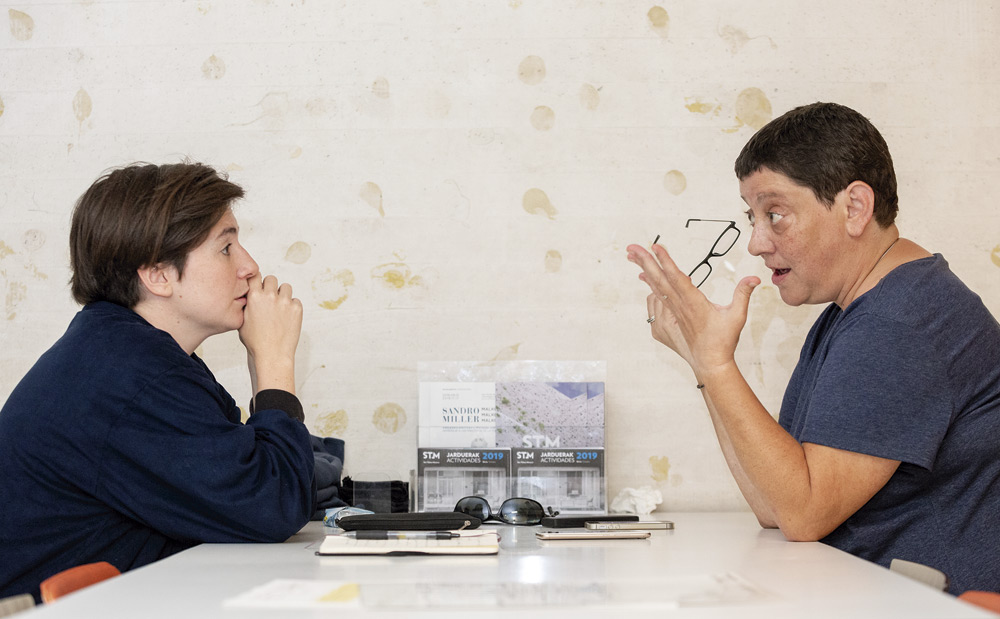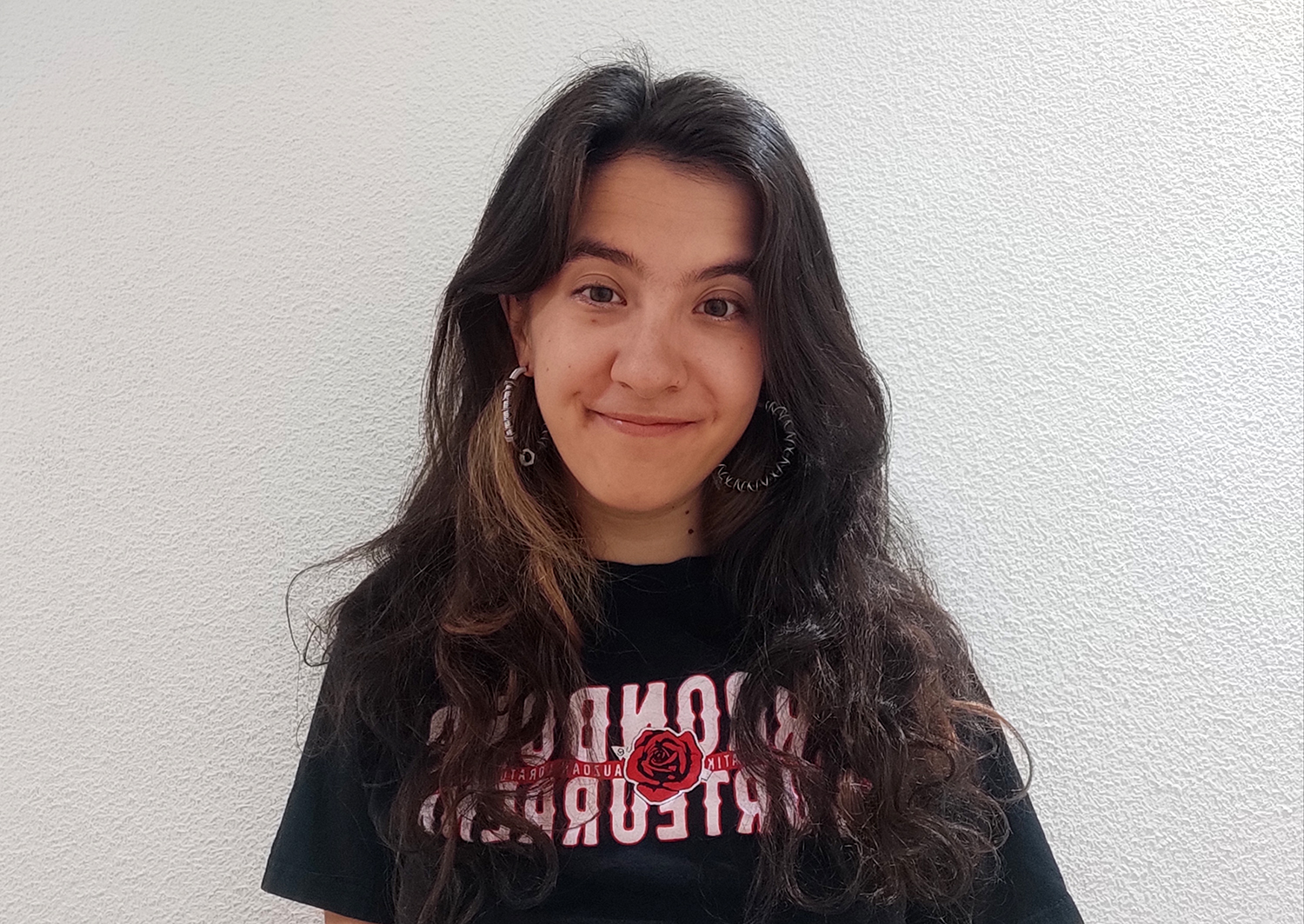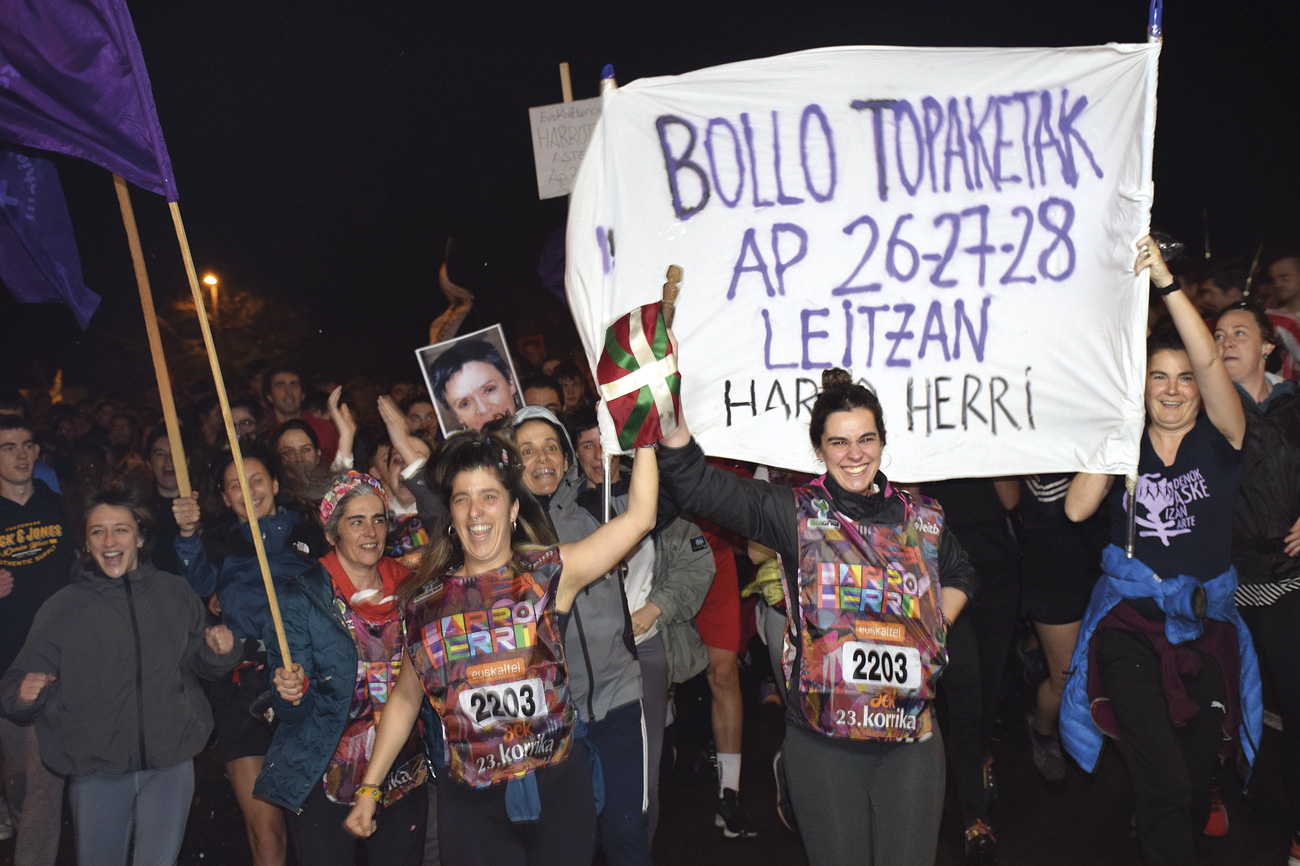"Lesbian visibility remains a pending issue"
- At first, when I proposed to him to do the interview, Pilar Mendibil showed me his doubts. We stayed for coffee, we talked and finally accepted the invitation because it considers it important to gather the voice of the people who have made a path like yours. The nuance is: “But I want to do it as part of the collective, because I am one of the members of the feminist movement and the feminist lesbian collectives.”

Gazterik hasi zen mugimendu feministan militatzen, Donostiako Emakumeen Asanbladan lehenik eta Gipuzkoako Lesbiana Feministen Kolektiboan ondoren. Madrilen bizi zela, bertako feminista lesbianen taldean aritu zen. Lesbiana feministatzat du oraindik bere burua, “izaera politikoa” ematen baitio lesbiana izateari. 2015ean, Donostiako udal hauteskundeetan, Plaz! hautagaitza feministan parte hartu zuen, eta azken urteetan feministak arloka batzeko saiakeran aritu da (Eragingune Feminista). Arlo profesionalean, Euskaldunon Egunkaria, Egunero eta Berria komunikabideetan lan egin du, produkzioan eta kudeaketa-buru.
From a very young age he began to militate in the feminist movement, among other things, in the Women’s Assembly of Donostia. Then you created the Feminist Lesbians collective of Gipuzkoa. Why?
Some lesbians who were in the feminist movement worried us because we wanted to work more on lesbianism, and the feminist movement of the time was immersed in the struggle for free abortion. The goal of this struggle was not only to obtain the right to abortion, but through the feminist movement many people were able to abort clandestine, which carried a lot of energy. Lesbians had little room there, and at one point we decided we had to do something. Some of us were in the House, and they were also around EHGAM – the first lesbian group in the Basque Country, for example, was ESAM, founded in 1979 and referring to EHGAM. There we had a discussion in which we could influence more, and there were contradictions in both. EHGAM for us was a very masculine movement, and at that time feminism had a very heteronormative activity, probably because of the same situation.
You finally decided to act within feminism.
Yes, in 1983, the first lesbian congress in the Basque Country. We organized meetings in Zamalbide, Errenteria. In these encounters, we debated where we would create groups, if in the gay or feminist movement, and we decided to do it in the feminist movement. Once this was done in the Zamalbide, the first groups began to be created.
What were the demands and struggles of that time? What did feminists demand and what did lesbian women demand?
We as a feminist, and I put myself there, 80 percent of the work we did in the assembly was related to abortion. In the case of the lesbian collective, we had two objectives: one, to influence the feminist movement, another point of view, to achieve a discourse that contradicts that heterosexual norm; and another, the lesbian classic, to achieve visibility. Lesbian visibility is, then and now, an unsolved problem. And there's another element that I don't see as much now: the revolution of the patriarchal system, we wanted to make a speech against it. In the collectives, we had a big problem when the struggle for homosexual marriage came about.
Why?
We have always acted in favour of individual rights, that is, in this society many rights are recognised within the couple or the family, and we were convinced that we should fight for individual rights. It's true that marriage is discrimination, why can't you marry and the other one? But what campaign does it take you to do? We had to fine-tune the speech a lot.
Today, the Basques have the right to marry a person of the same sex. It was approved in Spain in 2005 and in France in 2013.
Yes, and I think it is good, as we get another world, we too have to have the same rights as everyone else to live. But good. We have mentioned visibility before. We can marry the lesbians that we live in Euskal Herria and those of Hego Euskal Herria, we can have children, but we don't exist anywhere. We are more forced by these kinds of situations in the ikastola: lesbian mothers are going to pick up the children, and that reality takes them out of the closet, but that's a personal reality. Gays, there are boys in the world of culture, politics… but where are lesbians? Why don't they say it? Because there is, and we know, but… It seems to have normalized, but what model does a young lesbian of today have to say, “Look, it’s guaia!”, and not only that, that she can have a good life to think about?

What kind of activities did you organize to enhance visibility?
You have to face it, honey! That was great. We had serious problems. A lot of pictures were taken back in the day. The first lesbians we left at ETB were Asun Urbieta and I. The appearance on television was terrible. In those programs they told us terrible things, for example, “I would make a hole in the ground, put all of you in and take the hole.”
As a group, in 1989 we drew up a poster saying: “Why are you heterosexual?” We took it out on 8 March, not 28 June. It was a very uncomfortable poster (also for some in the assembly), because the question was addressed to the heterosexuals. It was an attempt to turn around the question of why are you a lesbian? Subsequently, so did the collectives of the Spanish State.
What has militancy brought you?
Thanks to feminist activism, I've learned that struggle is the only way -- (Laughter) -- and I mean that seriously. And collective. We were always signed as a collective, we felt part of a collective, we were tribes, maybe something endogamic... Lesbians of my time, in our life process, we have lost our childhood crew and we have had to create a different environment. So, the members of the group were friends, we lived together, we were militant together, and for us the militancy was everyday, the coordination meeting we had every weekend -- we were 100 percent. Feminism, for its part, has given me a lot of self-esteem and power. By ideology, on the one hand, and on the other, because in her day to be a public lesbian demanded that you be empowered, if not…
He spent twenty years in the professional field, working in Euskaldunon Egunkaria and Berria.
In the Basque Country, there have been four national newspapers in Basque: Day in its day, then Euskaldunon Egunkaria, Every day – nobody remembers but from Egunkaria to Berria was Every day for four months – and Berria. I've been in three of these four papers.
"In the feminist movement there has been a great development in Euskera and in the languages of those who come from outside"
What did you do?
Journalists write and think about how the product is going, but then there's a lot of people doing it, and with the work of journalists, you couldn't get a paper out of it, neither the radio nor the television. There's what we call the editing system. In the case of Berria, journalists write, but to be able to write them, the designer has made models, the technicians have guaranteed their computers, there are administrators, those who take care of the premises and the salaries… In particular, in the writing there is a group of Euskera that, once written, tries to improve and correct what journalists write, and works the photos… There is a great process to improve the work of journalists. They give it a plus of quality. I've been dealing with this process for many years.
And what do you remember?
Very good. I really liked the work. Two axes have influenced me a lot in what I am today: feminism and work in Egunkaria, in Berria and in the Basque world, the dedication and energy that have dedicated me to it.
As in the feminist movement you have fought for lesbians, in the Basque sphere you have fought for feminism. Always at the crossroads?
In the feminist movement, I've done pure militancy, I wanted to be there and dedicate my time to it. In Egunkaria and in Berria it was work, although working on it is also militancy, and even more so in the early days of Egunkaria. We took a lot of hours. Holidays, Saturdays… In the end, Egunkaria’s performance meant, in some way, the abandonment of the feminist movement, because it was not compatible. In the feminist movement we always tried to bring to the Basque what we were doing, because some of us are Euskaldunes and it seemed to us that we also had to help in that. On the other hand, in Egunkaria and in Berria, I have spent almost every year in positions of responsibility, in the direction, and that allowed me to influence: on the one hand, making a fairer product – because, in the end, being a more feminist product is being a fairer product – and on the other, having a greater presence of women in the structure. But also in other things.
For example?
For example, on that road I have told you before, on that road of revolutionizing the world, there are some particularities in the Berria Labour Pact. Imagine that people, when they get married, have fifteen days of leave, and also the people who get married want to receive them. You cannot, therefore, oppose this, because the status of workers provides for it. But what happens, people who don't live with a partner don't have the chance to spend 15 days with a partner? In our society, it is possible to marry, to divorce, to remarry… to infinity, and I will always have fifteen days, but the others do not. However, the Berria Labour Pact states that if you are a Berria worker and are three years old, you are entitled to a 15-day leave. Or another: The Berria work agreement explains that my mother's neighbor will be released for three days; in general, it will be that son's mother or father, but if I live with my sister and she is pregnant, I, in Berria, will have three days. Having worked on these things, having thrown the seeds of those discussions, makes me very proud.
Is the connection between Euskera and feminism clearer today? What has that path been like?
I'm going to talk to you about my sensations. In the feminist movement there has been great development with the theme of languages, not only with the Basque Country, the fact that there are a lot of people coming from outside and having several languages has opened a reflection in the feminist movement. The political choice that the movement has taken is to speak in Basque, but respecting the languages of others. Whispering is a good example. Space also influences, of course, it is not the same to act in Vitoria as in Azpeitia or in San Sebastian, now and before. The goal of the feminist movement has always been to put the sensitivity and situation of the Basque country on the agenda, and I say this because it seems that the feminist movement of 30 years ago was Spanish, and as I was there, I mean it was not. The feminist movement was part of the reality of its time, and it was very different to work in Azpeitia, Donostia and Gasteiz.
What about feminism in the Basque world?
I also see that in Euskalgintza, as in the whole of society, with the presence and strength that feminism seems to have taken, some exercises are being done. Seen how, with the issue of abortion, the feminist movement managed to push back the Spanish law, or what mobilizations have been organized in the face of this brutal violation of Pamplona, I believe that this is also why it has been put in the face of feminism. For example, in these days, on account of the law of the Basque Country of Navarre, more than one has mentioned whether it will be possible to carry out the great mobilizations that occurred in his day at the expense of abortion or the violation of Pamplona. Therefore, interest is not limited solely to the ideology of feminism, that is, because they have realized that they are also male; they also have an interest in the strategy of feminism, “we have where to learn”, they say.
He said that they are doing some exercises in Basque and in society. What fruit has it given?
In our world, in the world on the left, and therefore also in the world of the Basque Country, they have realized that no woman is seen in the photo, they have reflected on the type of direction and have made some, honest efforts. But I have the reluctance that when the women who are there start to question things or want to do things differently, a terrible crisis has been created. I think we are at that moment, both on the left and in the Basque world.
What is more, it seems to me that it is no coincidence that at the expense of the book written by Uxue Alberdi and the Bertsolaris women it is said that silence has prevailed. In my opinion, the book Kontrako eztarritik, while talking about the world of bertso, changing a few things, would be very good to talk about our world.

























